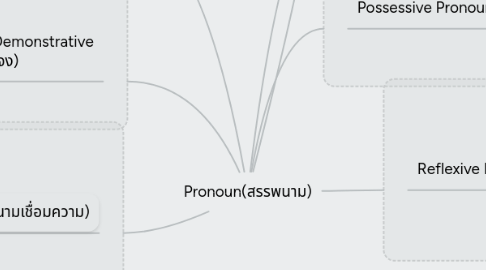Pronoun(สรรพนาม)
저자: Panwad Pan Khantichot

1. Definite Pronoun หรือ Demonstrative Pronouns(สรรพนามเจาะจง)
1.1. คือ สรรพนามที่บ่งชี้ชัดเจนว่าแทนสิ่งใด
1.2. ได้แก่ this, that, these, those
1.3. เช่น That is incredible! นั่นมันเหลือเชื่อจริงๆ (เป็นการย้ำถึงสิ่งที่ผู้พูดและพูดฟังเห็น)
2. Personal Pronoun (บุรุษสรรพนาม)
2.1. คือ สรรพนามที่ใช้แทนบุคคล หรือสิ่งของที่เราพูดถึง
2.2. เช่นI have a pet. It is a cat. ฉันมีสัตว์เลี้ยงหนึ่งตัว มันคือแมว (ในที่นี้ใช้ It แทน cat)
3. Interrogative Pronoun (สรรพนามคำถาม)
3.1. คือ สรรพนามที่ใช้ในการถามคำถาม
3.2. ได้แก่ Who, Which, What
3.3. เช่น What happened! เกิดอะไรขึ้น (มีสิ่งที่เกิดขึ้นโดยที่ผู้พูดและฟังไม่ทราบว่าหมายถึงสิ่งใด)
4. Relative Pronoun (สรรพนามเชื่อมความ)
4.1. คือ สรรพนามที่ใช้แทนคำนามในประโยคหน้า และยังเชื่อมให้ประโยคสองประโยคมีความหมายไปในทางเดียวกัน
4.2. ได้แก่ who, which, that
4.3. เช่น The book that she wrote was the best-seller หนังสือเล่มที่หล่อนเขียนเป็นหนังสือขายดี (ใช้ that แทน the book)
5. Possessive Pronoun (สรรพนามเจ้าของ)
5.1. คือ สรรพนามที่ใช้แสดงความเป็นเจ้าของ
5.2. ได้แก่ mine, yours, his, hers, its, theirs, ours
5.3. เช่น It’s mine. มันเป็นของฉัน
6. Reflexive Pronouns (สรรพนามตนเอง)
6.1. คือ สรรพนามที่ใช้บอกว่าดัวยตัวของ…..เอง เป็นคำที่มี –self/-selves ลงท้าย
6.2. ได้แก่ myself, yourself, himself, herself, itself, ourselves, yourselves, themselves
6.3. เช่น You have to tell him the truth yourself. คุณควรจะบอกความจริงกับเขาด้วยตัวของคุณเอง
7. Indefinite Pronoun (สรรพนามไม่เจาะจง)
7.1. คือ สรรพนามที่ไม่ได้เน้นเฉพาะว่าเป็นใครหรือสิ่งไหน
7.2. ได้แก่ everyone, everybody, everything, someone, somebody, something, anyone, anybody, anything, each, another, either, one, no one, nobody, nothing, neither, others, many, several, both, few, all, more, most, some, such, any, none
7.3. เช่น Nobody is perfect. ไม่มีใครที่สมบูรณ์แบบ (ไม่ได้ชี้เฉพาะว่าใคร)


